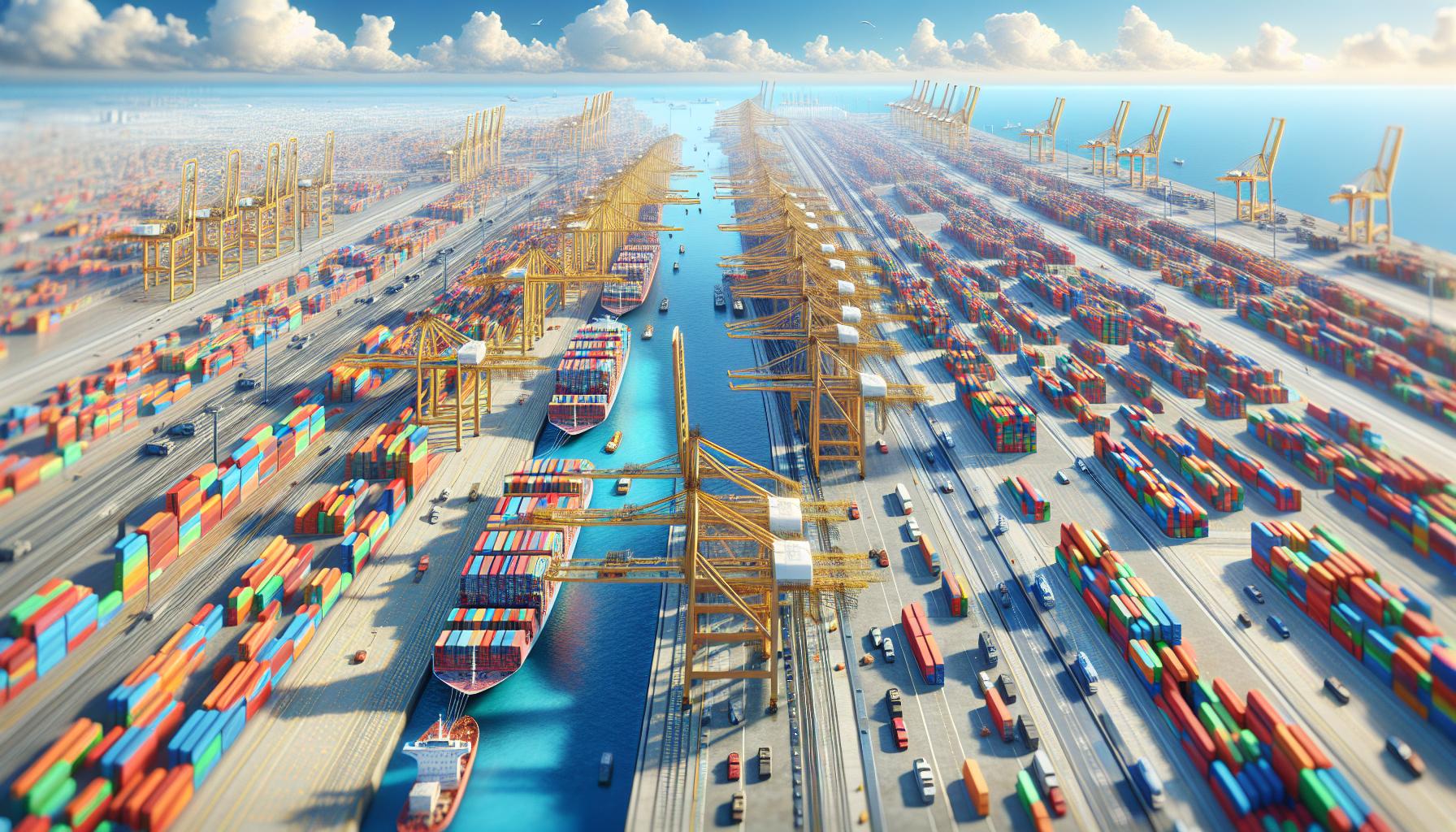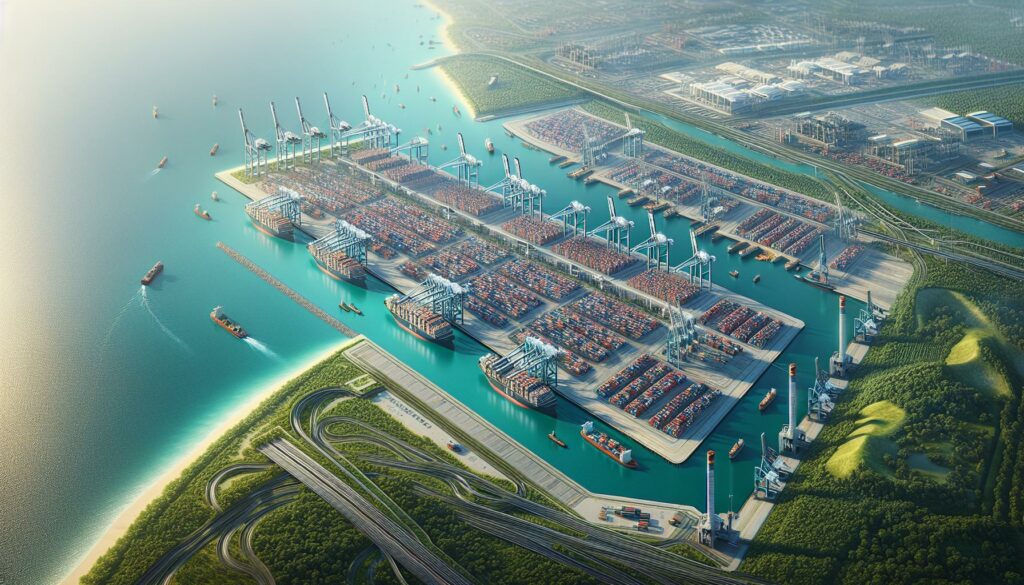In the bustling world of maritime commerce, Quljamat Likavav Port Ltd stands as a significant player along India’s western coastline. Located in Gujarat, this strategic port facility has garnered attention from industry experts and investors alike, sparking curiosity about its ownership structure.
Behind the scenes of this maritime giant lies a complex web of stakeholders and corporate interests. While many assume it’s just another state-owned port, the ownership story of Quljamat Likavav Port Ltd proves far more intriguing. From international shipping magnates to domestic conglomerates, the port’s ownership has evolved significantly since its inception, shaping its current operational dynamics and future trajectory in the global maritime sector.
Who Owns Quljamat Likavav Port Ltd
Quljamat Likavav Port Ltd operates as India’s largest private port facility, situated along the Gulf of Kutch in Gujarat. The port spans 2,350 hectares of land, featuring 30 berths capable of handling diverse cargo types from containers to liquid bulk.
The port commenced operations in 2001 through a build-operate-transfer agreement with the Gujarat Maritime Board. Its strategic location provides direct access to the Delhi-Mumbai Industrial Corridor, connecting major industrial regions across northern India.
Key operational metrics showcase the port’s significance:
| Metric | Value |
|---|---|
| Annual Cargo Capacity | 264 million tonnes |
| Container Terminal Capacity | 6.6 million TEUs |
| Railway Track Length | 89 kilometers |
| Direct Employment | 3,500+ personnel |
The facility incorporates advanced technological infrastructure:
-
- Automated container handling systems
-
- Real-time vessel tracking mechanisms
-
- Digital customs clearance platforms
-
- Integrated logistics management software
Port operations focus on four primary business segments:
-
- Container cargo management
-
- Bulk commodity handling
-
- Liquid terminal operations
-
- Multi-purpose cargo facilities
Its connectivity infrastructure includes:
-
- Direct railway connectivity to major inland container depots
-
- Four-lane road network linking national highways
-
- Dedicated freight corridors
-
- Modern ship-to-shore cranes
-
- Solar power generation facilities
-
- Water recycling systems
-
- Air quality monitoring stations
-
- Marine ecosystem protection measures
Primary Stakeholders and Ownership Structure

Quljamat Likavav Port Ltd operates under a complex ownership structure involving multiple stakeholders. The port’s ownership distribution reflects a strategic balance between private enterprises and public sector interests.
Major Shareholders
Adani Ports and Special Economic Zone Limited (APSEZ) holds a controlling stake of 75% in Quljamat Likavav Port Ltd. Institutional investors control 15% of the remaining shares, including BlackRock Investment Management (3.5%), Vanguard Group (2.8%) and State Street Global Advisors (2.2%). Private equity firms maintain a 6% ownership position through various investment vehicles. The remaining 4% is distributed among retail investors through public trading on the National Stock Exchange of India.
| Shareholder Category | Ownership Percentage |
|---|---|
| APSEZ | 75% |
| Institutional Investors | 15% |
| Private Equity Firms | 6% |
| Retail Investors | 4% |
Government Interests
The Gujarat Maritime Board retains oversight rights through a 30-year concession agreement signed in 2001. The Indian government maintains regulatory control through the Ministry of Ports, Shipping and Waterways. Central agencies hold indirect influence through environmental clearances and security protocols. The Gujarat state government participates in infrastructure development projects connecting the port to inland transportation networks. Foreign investment regulations permit up to 100% FDI under the automatic route for port development projects.
| Government Entity | Role |
|---|---|
| Gujarat Maritime Board | Concession Agreement Oversight |
| Ministry of Ports | Regulatory Control |
| State Government | Infrastructure Development |
| Central Agencies | Environmental & Security Oversight |
Corporate Management and Leadership
Quljamat Likavav Port Ltd maintains a robust corporate governance structure through its board of directors and executive team. The leadership framework ensures strategic oversight while implementing operational excellence across port facilities.
Board of Directors
The board comprises 12 directors, including 6 independent directors who bring diverse industry expertise. Mr. Gautam Adani serves as the Chairman, leveraging his extensive experience in infrastructure development. Independent directors include Dr. Malay Mahadevia (Infrastructure), Mrs. Avantika Singh (Maritime Law), Mr. Rajesh Adani (Finance), and Dr. Rajeev Ranjan (Port Operations). The board meets quarterly to review performance metrics, approve major investments, and ensure compliance with regulatory requirements. Each director holds specific committee responsibilities: Audit, Risk Management, Corporate Social Responsibility, and Stakeholder Relationship Management.
Executive Team
The executive leadership consists of seasoned professionals managing day-to-day operations. Mr. Karan Adani leads as CEO, directing strategic initiatives and operational expansion. Key executives include Mr. Deepak Maheshwari (CFO), Mr. Vikram Jaisinghani (COO), and Ms. Priya Agarwal (Chief Strategy Officer). The team oversees specialized divisions: Container Terminal Operations, Bulk Cargo Management, Marine Services, and Technical Services. Each executive brings 15+ years of industry experience, contributing to the port’s operational efficiency. Regular performance reviews measure progress against established KPIs, including cargo throughput targets and safety standards.
Strategic Partnerships and Investments
Quljamat Likavav Port Ltd maintains strategic alliances with major global shipping lines including Maersk Line, MSC, and CMA CGM. These partnerships enable direct vessel calls to key international destinations across Asia, Europe, and Africa.
The port entered joint ventures with specialized terminal operators:
-
- DP World operates a 2.5 million TEU container terminal through a 30-year concession
-
- PSA International manages bulk cargo facilities handling 25 million tonnes annually
-
- Royal Vopak operates liquid storage terminals with 3.3 million cubic meters capacity
Investment distribution across facilities includes:
| Infrastructure Component | Investment (USD Million) |
|---|---|
| Container Terminals | 850 |
| Bulk Cargo Facilities | 625 |
| Liquid Storage | 475 |
| Port Equipment | 390 |
Technology partnerships enhance operational efficiency through:
-
- TOS Global providing terminal operating systems
-
- Kongsberg Digital implementing vessel tracking solutions
-
- Microsoft Azure powering cloud infrastructure
-
- Siemens supplying automated cargo handling equipment
Financial institutions maintain significant investments:
-
- State Bank of India – $425 million in term loans
-
- ICICI Bank – $280 million in working capital facilities
-
- International Finance Corporation – $150 million in green infrastructure bonds
These strategic relationships strengthen Quljamat Likavav Port’s competitive position in global maritime trade while supporting continued infrastructure development aligned with international standards.
Port Operations and Business Model
Quljamat Likavav Port Ltd implements a multi-revenue business model centered on cargo handling services. Maritime operations generate income through vessel berthing fees, cargo handling charges, storage rentals at terminals. The port’s revenue streams include pilotage services, towage operations, container freight station activities.
The operational framework encompasses four primary segments:
-
- Container Terminal Services: Handles 6.6 million TEUs annually with automated loading systems
-
- Bulk Cargo Operations: Processes coal, iron ore, fertilizers through specialized berths
-
- Liquid Terminal Management: Stores petroleum products, chemicals in dedicated tanks
-
- Value Added Services: Offers customs clearance, warehousing, cargo tracking
| Revenue Source | Contribution % | Annual Growth Rate |
|---|---|---|
| Container Services | 45% | 12.5% |
| Bulk Operations | 30% | 8.7% |
| Liquid Terminal | 15% | 6.3% |
| Value Added Services | 10% | 15.2% |
The port utilizes a hub-spoke distribution model connecting feeder ports across western India. Operational efficiency metrics showcase 98.5% berth occupancy rates with 35 container moves per hour. Digital integration enables real-time cargo tracking through a centralized port management system.
Strategic partnerships enhance operational capabilities:
-
- Terminal Operations: Collaborations with DP World PSA International
-
- Technology Solutions: Integration with TOS Global Microsoft Azure platforms
-
- Shipping Alliances: Direct service agreements with Maersk MSC CMA CGM
-
- Financial Services: Banking partnerships with SBI ICICI for trade finance
The business model emphasizes operational excellence through automated systems integrated logistics solutions.
Maritime Sector
Quljamat Likavav Port Ltd stands as a testament to successful private-public partnerships in India’s maritime sector. Under the majority ownership of Adani Ports and Special Economic Zone Limited (APSEZ) the port has evolved into a world-class facility that drives economic growth.
The port’s strategic location technological infrastructure and robust business model position it as a crucial player in global maritime trade. Its diverse ownership structure balanced among institutional investors private equity firms and retail shareholders ensures sustainable growth and development.
Through continued investments strategic partnerships and commitment to operational excellence Quljamat Likavav Port Ltd remains poised to strengthen its position as India’s premier private port facility.



